As Angela Merkel enters her last year as Chancellor, her legacy remains oddly inconclusive, but the coming U.S. election may present her with a fateful choice between rebuilding trans-Atlantic relations or seeking refuge in the East, argues Constanze Stelzenmüller. This post originally appeared in the Internationale Politik Quarterly.
It is mortifying to have to begin a column with a confession about one’s worst-ever prognosis. But in October 2005, I wrote for the Financial Times about the recent German election: “Ms. Merkel’s grand coalition … is merely an interregnum arrangement. With luck, it will last two years.”
I may or may not have added, “Ms. Merkel might turn out to be a dead woman walking: a leader beginning the end of her career rather than ending the beginning.”
Chancellor Angela Merkel is now entering the last year of her fourth and—she vows—final term in office. She has already been in power for more years than West Germany’s first leader Konrad Adenauer (1949-63). Depending on how long it takes to form a government after the next election, due in fall 2021, she might even overtake Helmut Kohl (1982-98) to become Germany’s longest-serving postwar leader.
The 66-year-old’s popularity has soared during the pandemic, making her the country’s best-liked politician by a long shot, and Germans also give her government top marks. As one commentator noted, she “is now on her third American and fourth French presidents, her fifth British and seventh Italian prime ministers.” A recent U.S. poll of 13 countries showed Merkel to be the world’s most trusted leader, well ahead of all of her peers. Depressed American and British commentators, in particular, have taken to calling her the “leader of the free world” (a title the chancellor is said to detest).
So, I got that really, really, really wrong. I’ve never met the chancellor, and probably never will, so this is probably the best place to say: sorry, Ms. Merkel.
An Inconclusive Claim to Fame
Still, such an Alpine range of political capital begs questions. Where did it come from? What will she do with it?
Adenauer’s claim to greatness was Westbindung—anchoring the young West German republic in the transatlantic alliance. Willy Brandt (1969-74) sought reconciliation with Eastern Europe, falling to his knees in Warsaw. Helmut Kohl gave up the deutschmark for the sake of a European currency and steered the two Germanies to reunification. Each one left office against his will and under a shadow: Adenauer, because he had clung on too long; Brandt, a heavy drinker, because of a spy affair; Kohl’s record is tarnished by a party finance scandal. Yet all three were great chancellors.
Meanwhile Angela Merkel’s claim to a place in the annals of fame remains oddly inconclusive. Certainly, the character flaws of some of her predecessors elude her. She only ran for a fourth term after agonizing reflection, and stepped down gracefully as party head after two regional election defeats for her party in 2018; she has firmly excluded running again—or seeking any other public office. She is famously hard-working and in total command of her material. Her sobriety and probity are in no doubt.
And yet ambiguity envelops her record. Perhaps it is rooted in the fact that many of the most significant achievements of her tenure have come with a darker underside.
The Merkel era saw Germany roar from “sick man of Europe” to the world’s fourth-largest economy, with sharply rising living standards. Her economic policies were notably business-friendly, but failed to do enough when it came to technological and infrastructure modernization. Scandals, from “Dieselgate” to the Wirecard drama, reveal a deeply flawed corporate culture, and a resistance to accountability that makes the German economy highly vulnerable to illicit financial flows.
Merkel’s decision not to close Germany’s borders against a huge wave of refugees in September 2015 was an act of genuine humanism. It was also the responsible thing to do; it took pressure off much weaker neighbors. Most of those who stayed have become integrated into society and the workforce. But cities and states struggled to cope at first. It took a multi-billion euro deal with Turkey’s President Recep Tayyip Erdoğan to stop the flow of migrants. And it propelled an obscure right wing party, the Alternative für Deutschland (AfD), to leader of the opposition a mere four years after it was founded.
A True Believer
The chancellor’s move to support the European Recovery Program in May deserves a place in the history books—it probably saved the European Union. But her government’s insistence on austerity for Greece during the eurozone crisis, and her failure to call out fellow Christian Democrat Viktor Orbán for turning Hungary into an illiberal democracy, deepened European divisions.
Merkel is a true believer in the transatlantic alliance, yet she struggled to stand up to U.S. President Donald Trump, and failed to keep Germany’s defense commitments. Her reluctance to recognize and counter Russian and Chinese interference in the European space for what it is—efforts to establish dominance and undermine the cohesion of the West—has weakened the EU in a dark time.
When the chancellor rises to the occasion, she shows herself to be a shrewd and empathetic leader who can forge common purpose out of disunity —as she has done at many EU and G-7 summits, and during the pandemic. Ruling a fractious Germany with three grand coalition governments (and one with the pro-business Free Democrats) —is in itself an achievement. Yet she will be equally remembered for her hesitancies and an often maddening incrementalism. By pushing her own center-right Christian Democrats to modernize, she marginalized her coalition partners, the center-left Social Democrats, and left a gaping vacuum on the right flank of her own party, promptly filled by the AfD.
Admired but Lonely
Finally, after a political lifetime of expertly eliminating rivals, she is left with no plausible heir. So, the chancellor finds herself, as the longest-serving leader in Europe, in much the same place as her country: admired, but rather lonely.
Where does that leave her legacy? Grand gestures are not Merkel’s style; and she may well try to kick political liabilities like Nord Stream 2 or the fight over 5G to her successor. The U.S. elections, however, might give her a fateful choice: to re-build bridges over the Atlantic, or seek refuge in the East. I’d like to think the good bet is on the former.
But then again, you may not want to trust my judgment.
The Brookings Institution is committed to quality, independence, and impact.
We are supported by a diverse array of funders. In line with our values and policies, each Brookings publication represents the sole views of its author(s).
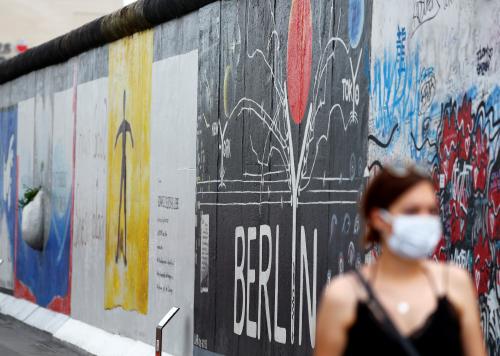
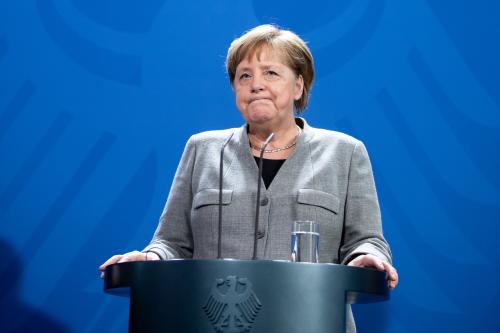
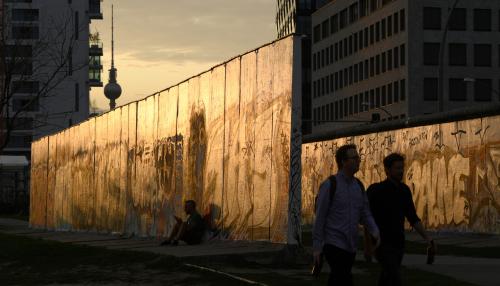

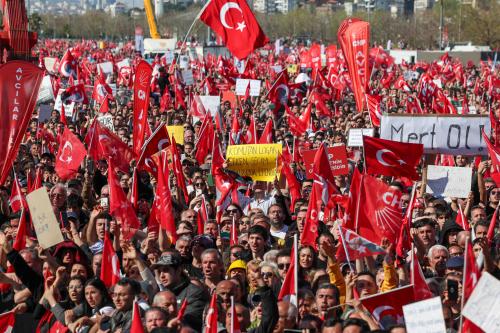
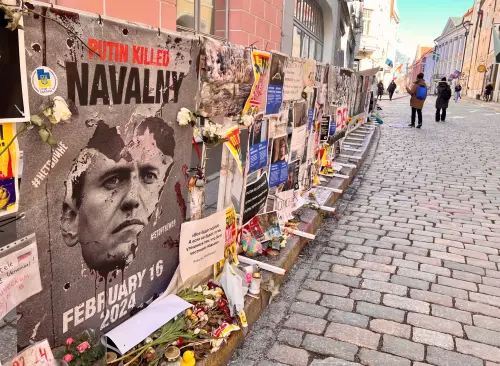
Commentary
Angela Merkel’s final year
September 30, 2020